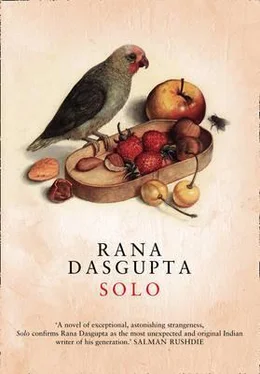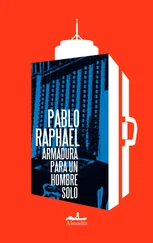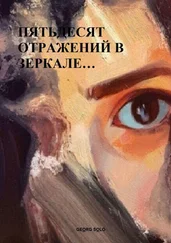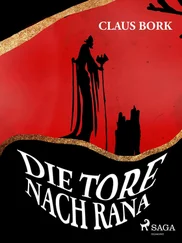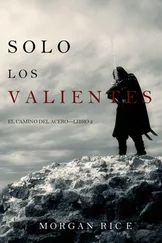In a blink, embark rebellious! , the band has exploded with a riot-dance and Boris stamps exultant like a seven-foot Gypsy, vaulting in a circle, a Cossack caper, shouting the spirit for all he is worth, Hey! Hey! Hey! he cries like seven giant peasants, and in a slow-motion second the trussed audience unfurls euphoric, it opens like a canyon, proclaim the tsunami klaxon after flesh! , and they all stand like the glorious mountain-bud, they thank the journey, what relief, what exaltation, what—
Beautiful beautiful beautiful I am speechless before your song
Liquid is flowing again in the dry conduits
I cannot tell, I cannot tell, I cannot say the way it fell
The music has merged with tumult, and Irakli sees a passage open up before him. He is on the stage already, his Georgian dance erupting, his Caucasian footwork a-flicker. He jumps and reels and the crowd watches in delight, the band drawing round. This audience will rip down the building, it will howl and fornicate. Irakli leaps high in the air and lands flat on his back with the end chords, laughing unheard in the impossible roar. There are people standing on tables, weeping openly.
Boris gives Irakli a hand and pulls him up. The band goes offstage.
The crowd is on its feet, and Plastic has to shield his way through the corks they are throwing at the stage, which is empty with its piano and silent chairs. They shout for Boris but he is in the black-and-white backstage, the light bulbs burning and shadows under his cheekbones. The other musicians are there too, who have not words for what has happened. The pianist smokes a cigarette, trying to piece it together.
Plastic beckons to Khatuna and takes her hand in the crush. With her other she reaches for Irakli so as not to lose him. Plastic leads her out of the bellowing mass, he hauls her backstage to Boris’s dressing room — and she likes the strength of his grip. The doorway is thronged, and there’s no space to see what is happening inside. There are men trying to get in with tripods and video cameras. Plastic tells them to clear the entrance and forces his way through with Khatuna and Irakli. In the full light he notices Irakli for the first time.
‘Aren’t you the guy who danced onstage?’
A well-known novelist is drinking champagne from the bottle. The ones who have tricked and lied their way in here stand wide eyed, trying to look as if they belong. Boris is taking hungry bites of a hamburger.
A cameraman puts a microphone in Plastic’s face and asks him to comment on the show. Plastic serves up some simple but effective phrases over the noise. But the journalist is angling for something profound:
‘It’s a very tragic place, isn’t it? The Balkans? Would you say that came through in his music?’
Plastic wants to get out of here, he calls his people to evict the media. He gives everyone the address of the restaurant for dinner and takes his people through the back door.
Khatuna and Irakli do not go with him. They have to get their stuff from the coat-check.
They weave back through the crowd in the club. They are high on alcohol and sensation when they make it to the lobby. The attendant hands over coat and umbrella to Khatuna. Irakli looks in through the little wooden ticket hatch. The old woman has gone home, and the office is dark except for the glowing fishes drifting restfully across the computer screen. Slack faced, he watches them for a while and, such is his altered mind, he has the feeling, when he walks out to the street, that the wet splashes on his face are dripping from those fish. Khatuna puts up his umbrella, and he realises it is rain.
They walk towards the address Plastic has given them, and at the end of the first block they find Boris standing alone.
‘What are you doing here?’ asks Khatuna.
‘I wanted to walk on my own,’ says Boris. ‘But I don’t know which way from here.’
Khatuna holds the umbrella over him, and they set off, the three of them huddled close, happy and optimistic, three ordinary kids in the night.
‘It’s just down there,’ Khatuna says lightly.
At that moment, the umbrella flies out of her hand and catches in some railings. She runs after it in her heels, racing her brother, laughing at the rain on her dyed-blonde hair, her fur coat flaring on the wind.
Plastic had booked a private room in a Vietnamese restaurant. The table was already laid with hors d’oeuvres, and the music critics waited for him to seat them. Two waitresses walked the length of the room, ceremonially releasing disinfectant spray above their heads, like in an aircraft.
People applauded as Boris entered, and took photographs of him with their phones. There were crystal drops down the back of his jacket and his hair was damp. The Bulgarian princess shook her head with emotion and put her arms reverentially around him. The journalists gathered close.
‘What do you call your music? Is it jazz? Is it Gypsy?’
‘You’ve been described as a feral child . Do you know what that means?’
The novelist shook Irakli by the hand.
‘Your dancing was spellbinding,’ he said. ‘I would have done the same if I knew how.’
They sat down in groups. There were orchids on the table, and starters of tofu and soft-shell turtle. Everyone was seized by hunger. The room was full of steam and aroma, and they began to eat greedily. One of the critics said through his noodle soup,
‘Let’s not forget it was also the best performance of the Schnittke sonata anyone has ever heard!’
The movie director sat next to Khatuna and asked her about her work. She told him about advances in architectural security. She said,
‘We don’t make our buildings here any more. We bring them on a ship from China. They make everything there. If you want you can buy yourself a jail for next to nothing. It’s precast in concrete. You just tell them how many cells you want and they ship it over.’
There was roast duck, and beef with lemon grass. If you could have tuned out all the other sounds you would have heard a great cacophony of mastication.
The movie director was sweating a lot. He had taken it upon himself to explain to Khatuna a word she did not know.
‘It means what you’ve just written is wrong, and you know it’s wrong.’
He had coriander leaves caught in his teeth.
‘If you know it’s wrong, why would you write it?’
‘Maybe because you’re quoting someone else who wrote it wrong? So you put sic afterwards to show it wasn’t you.’
Khatuna was bewildered by the man’s approach. She thought he must be the most boring film director in the world. She said,
‘You get to sit next to someone like me, and this is all you can find to talk about?’
She wanted to know Boris. He had unbuttoned his military jacket, but still cradled his violin, even at the dinner table. She got out of her seat and went to him. She whispered in his ear,
‘You left me alone the other day! Where did you go?’
Her cheek had touched his forehead. Boris said,
‘I didn’t want to stay there any more.’
‘Why didn’t you take me?’
Boris did not reply. She said,
‘Will you come out with me now? We can find somewhere to be alone.’
Boris looked up into her eyes. He studied her, and then he said,
‘No.’
People began to change places around the table, and the bamboo room became jumbled. Clear-thinking waiters removed empty bowls and laid on full ones: stir-fried eel, shrimps with sugarcane, sautéed frogs, cuttlefish salad, lobster wrapped in rice and banana leaves. The meal was a riot for the tongue, and people slurped their wine loudly for the extra sensation.
Boris was trying out his chopsticks on the roasted suckling pig. He asked the Bulgarian princess whether they raised pigs in America.
Читать дальше
Конец ознакомительного отрывка
Купить книгу
